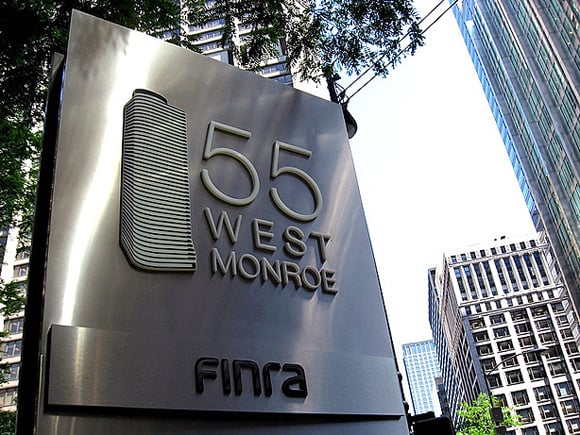For the past few months, Finra has been promoting itself as the logical choice to oversee the compliance efforts of RIAs. Thursday's announcement by the SEC -- that it has ordered the regulator to improve its own compliance -- probably won't bolster Finra's case. Neither will the revelation that a Finra director allegedly doctored records that the SEC wanted to examine.
A Finra office director who allegedly doctored records just hours before handing them over the SEC inspectors in 2008 has led to the broker SRO agreeing to hire an independent consultant and pledging to step up its internal compliance procedures.
The director of the Financial Industry Regulatory Authority Inc.'s Kansas City, Mo., office caused the alteration of three sets of Finra staff meeting minutes that Securities and Exchange Commission officials in Chicago requested and Finra delivered on Aug. 7, 2008, the SEC said in its administrative complaint. The changes made the documents inaccurate and incomplete.
It's rare that the SEC brings a case against an SRO and this settlement comes at a time when the SEC is considering ways to boost investment adviser oversight and is looking at whether Finra could act as a self-regulatory organization for investment advisers, similar to its role for broker-dealers.
The SEC's action could have real fallout for Finra, one securities attorney said. “This is a black eye for Finra and will likely be exploited by people who don't want Finra to be the SRO for registered investment advisers,” said Brian Rubin, a partner with Sutherland Asbill & Brennan LLP.
“Had a broker or a firm done what Finra apparently did, in responding to Finra, that broker or firm would not be treated near as lenient as Finra was here,” said Joel Beck, founder of The Beck Law Firm LLC and a former Finra enforcement attorney.
Under its own sanction guidelines, Finra would consider a fine, suspension or even a bar for falsification of documents, depending on how serious the violation was, Mr. Beck said. Finra was not fined and no individuals were named in the settlement announced today.
“The law requires Finra to produce the documents the SEC seeks in its examinations in complete and accurate form,” said Gerald Hodgkins, associate director of the SEC's enforcement division. “Although Finra has previously taken steps to improve compliance, those enhancements did not go far enough to prevent the document production failure that occurred in its Kansas City district office.”
The order aims to help Finra improve weaknesses in its training and procedures, Mr. Hodgkins said.
Chief executive Richard Ketchum said Finra reported the document issue to the SEC and cooperated with the commission staff that reviewed it.
When the alleged document doctoring took place, Finra's chief executive was Mary Schapiro, who is now chairman of the SEC.
“Following our own internal review, we took decisive action, including appointing new leadership in our Kansas City office and instituting a number of changes that strengthened document-handling procedures across the organization,” he said in a statement.
The changes Finra already made include additional online and live ethics training for all employees, and more focus on document integrity, the self-regulator said.
The meetings that were documented in the minutes took place in 2006 and January 2007, before the July 2007 formation of Finra through the consolidation of NASD and the New York Stock Exchange, and while the SEC's current chairman Mary Schapiro was Finra's chief executive.
In addition to the 2008 instance, an employee of Finra or predecessor NASD provided altered or misleading documents two other times over an eight-year period, the SEC said. The first two instances occurred in 2004 and 2005 and involved information being deleted or edited. In some cases, entire passages were removed, the SEC said.
In each of the three instances, the author's signature was changed to that of the Finra district office director, the SEC said. Without naming the individual, the SEC said that director resigned Sept. 20, 2010, the same day that Finra told the SEC about the document issue. Finra itself learned about the problem from a whistleblower complaint filed in June 2010, according to the SEC.
The Chicago office of the SEC was conducting a regular inspection of the Finra district office, which is responsible for the regulator's programs in 7 states, Missouri, Kansas, Iowa, Nebraska, Minnesota, North Dakota and South Dakota. The 15 Finra district offices are inspected every two or three years, the SEC said.
“It is unusual for the SEC to bring an enforcement action against an SRO, but the SEC is committed to protecting the integrity of our inspection program,” Mr. Hodgkins said.
Finra neither admitted nor denied the SEC allegations in settling this case. But Finra spokeswoman Nancy Condon said “we very much regret this occurrence. We hold ourselves to a high standard, and we have put extensive procedures in place to safeguard against problems like this occurring in the future.”
With additional reporting by Bruce Kelly and Dan Jamieson







